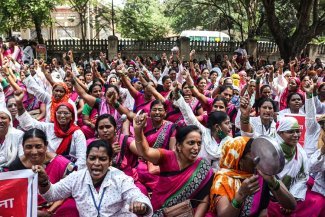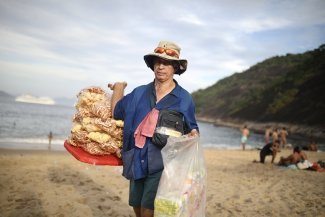
A survivor supported by her sister-in-law during a therapy session with psychologists from the Medica Gjakova association.
“I still have flashbacks,” says Blerta (all the names have been changed to protect the victims’ identity), staring into the void. She unconsciously straightens out the invisible creases in her trousers. The image of the lifeless bodies of the two women who had come to her aid, 20 years ago, remains etched on her memory. “Serb combatants raped and then killed them. I sometimes tell myself they are better off dead than having to live with this suffering,” she murmurs.
Between 1998 and 1999, the province of Kosovo, where the population is predominantly ethnically Albanian, was plunged into armed conflict with Serbia, from which it was seeking independence. More than 13,000 people lost their lives. Human Rights Watch had, in the year 2000, exposed the use of rape as a “weapon of war”. There are no verified or verifiable figures on the number of victims, but local organisations estimate that between 10,000 and 20,000 people were subjected to this form of violence. Blerta was pregnant at the time. Her eldest son saw everything. “It was difficult bringing up my children after that,” she confides.
Sitting in the comfortable lounge of the NGO Medica Gjakova, today Blerta is feeling a little better. Her troubled gaze meets the empathetic eyes of the three other women seated around her. They travelled the long journey together from their village to Gjakova, in western Kosovo. The NGO has been providing psycho-social support, such as group therapy, and legal assistance to survivors of wartime rape since 1999. “It has made our suffering easier to bear,” says Blerta.
Opening up to anyone outside the family circle about the violence, and especially the sexual violence suffered, is seen as a source of shame in Kosovo. The victims are held wholly responsible.
“The repercussions are terrible, especially for the women. Some have been forced to divorce, and young girls have been married to much older or disabled men,” says Sebahate Pacolli, project manager at the Kosovo Rehabilitation Centre for Torture Victims (KRCT-QKRMT).
As a result, the victims have long been ignored by the institutions. “This issue has never been a priority, because the politicians know that these victims will never protest publicly,” says Pacolli. The victim support associations in Kosovo, which are very united and organised, have dedicated two decades to trying to improve the plight of victims and pressing the state to support them. But they have come up against considerable resistance, especially from parliamentarians. “When the law on the categories of war victims was passed in 2006-2007, we tried to have the victims of sexual violence included. It was impossible,” recalls Pacolli.
“The state has given us support, and we feel stronger”
A milestone was reached in 2014, when Atifete Jahjaga, then president of the Republic of Kosovo, made the cause of victims of sexual violence and discrimination her very own. Her role meant that she had no direct influence over the legislative process but, shocked by the remarks made by parliamentarians during debates, and the helplessness of the victims, she used her position to involve the government, parliament and associations in a coordinated effort to tackle the issue and set up the National Council for Victims of Sexual Violence. The law on the categories of war victims was finally amended with the addition of “victims of wartime sexual violence”, giving them the right to a pension of €230 (US$260) a month, similar to the average salary earned by women in Kosovo.
In 2015, the Heroinat monument, designed by Ilir Blakçori, was unveiled in the very centre of Pristina, Kosovo’s capital city. A collection of 20,000 pins depicting the face of an Albanian woman, it stands as a permanent tribute to the victims.
And yet it still took four years to secure the budget and to set up the commission in charge of examining the victims’ demands. Drita was among the first to submit her application. “I never thought I’d live to see this day,” she says, sitting upright in her red sweater and matching lipstick.
Drita is happy, in spite of the delay: “The state has given us support, and we feel stronger.” The pension represents a form of emancipation for the victims, giving them greater freedom and the ability to contribute to the household income. Only 18 per cent of the women of working age in Kosovo are in employment. “Nothing can heal our pain, but this money helps us to survive,” adds Drita.
No end to the stigma
Whilst the survivors and NGOs welcome the progress made, “many women are still afraid to speak out,” says Mirlinda Sada, director of Medica Gjakova, and, therefore, to embark on the long and difficult process of applying for a pension. Only 911 applications were submitted between 5 February 2018, when the procedure was opened, and 31 December.
The women we interviewed continue to live in fear of their neighbours’ “gossip” and take great pains not to reveal anything that might expose them. Sihana has been a widow since the war and lives with her in-laws. “I don’t want anyone to know what happened to me because of the repercussions it would have on my children,” she says, expressing a fear that is constant among the victims. But she needs the money to be able to take care of herself. Many have kept their application secret. They have to come up with ploys to cover up the source of the income.
One woman, Vasfije Krasniqi-Goodman, has dared to speak out about her story. She went on camera, in October 2018, to tell of how she was taken from her home and then raped by two Serbians, in 1999. Married at a very young age, then divorced, she emigrated to the United States and has remarried. She made the trip to Pristina to testify “on behalf of all the victims”.
But not everyone in Kosovo appreciates seeing a woman talk about her suffering in public. Blerta stopped going to her neighbours’ after hearing them criticising her. “I couldn’t bear hearing them talk that way about a woman who went through the same thing as I did. I don’t feel safe around them anymore,” she explains.
The women entitled to the pension are also discouraged by the slowness of the procedure. The first applications filed were processed in good time, but, since then, hundreds have been piling up. Only 190 were approved in 2018, and a handful were rejected. Teuta has been awaiting a response for almost six months now. Her hearing is almost totally impaired – as a result of the abuses she suffered. “I have been totally dependent on my daughters since my husband died. I sit staring into space all day, a prisoner of my memories,” she says.
Reparations but no justice
For Mirlinda Sada, the delays are unacceptable. “Given the age of some of the victims and the physical impact of the rapes, we don’t know if they will receive their entitlements before they die,” she explains. She has already observed a fall in the number of applications. Time is running out. The survivors have only five years to make themselves known. The cut-off point is far too early, according to the NGOs supporting them.
Another serious limitation of the law is that it only covers the period from 27 February 1998 to 20 June 1999, the official dates of the conflict. “We have the case of a victim who was raped on 21 June, so she is not able to apply,” says Sada.
Serbian organisations have also denounced this limitation, which means the de facto exclusion of the victims of revenge attacks on minority communities following the withdrawal of the Serbian troops. There are no figures on the number of victims in this position. As underlined, however, in an Amnesty International report supported by witness accounts, published in 2017: “Both during the war, but predominantly in the months that followed, Kosovo Serb and Romani women and girls (and some men) were also subjected to rape and sexual assaults by members of the KLA or other armed groups.” More than 155 cases of alleged rape were recorded by UNMIK, the United Nations Mission in Kosovo, between June 1999 and December 2000. Albanian women accused of “collaboration” were also reportedly raped in revenge attacks.
Recognition is an important symbol, but only addresses a part of the survivors’ needs. “Many women say that money is nothing in comparison with what has been done to them. Access to justice is imperative. If those responsible were convicted, it would remove some of the guilt they are carrying,” Sada points out.
“Only four high-ranking Serb officials have been convicted by the International Criminal Tribunal for the Former Yugoslavia for crimes against humanity, including “sexual violence”. Serbia has convicted a Kosovar. Kosovo has only acquitted those tried, including those who raped Vasfije Krasniqi-Goodman, on procedural grounds. The cooperation between Belgrade and Pristina is non-existent.
“It’s hard to convince the victims to engage in the long legal process when it already takes so long to get a pension,” says Sada. Time is passing by, and hopes are fading. The witnesses are becoming fewer, memories of the details are slowly being erased, and all that is left is the pain.









